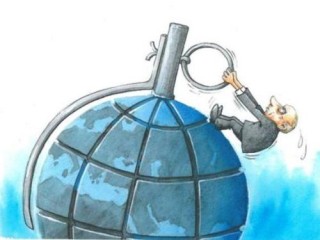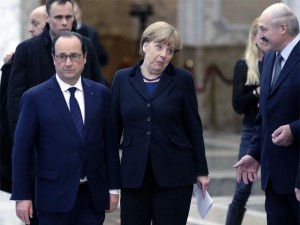Poland and Germany were both initiators and drivers of a New Eastern policy linked to the Eastern neighborhood and Russia/Soviet Union.
Uladzimir Matskevich: Kremlin is leading the game aimed at prolongation of conflict in Donbas

Putin regime has nothing to fear as long as Russian society is concentrated on the Russia-Ukraine war.
After the leaders of the “Normandy four” signed the Minsk agreements on February 11-12, 2015 truce at Donbas, however complicated, has been lasting for two months now. But the head of the “DPR” Alexander Zaharchenko has already told BBC that the Minsk agreements are doomed, while Vladimir Putin didn’t exclude the possibility of recognizing “DPR” and “LPR”.
Is the current truce leading to peace or is it the lull before the storm? EuroBelarus Information Service discussed it with Uladzimir Matskevich, philosopher and methodologist, the head of the Board of the International Consortium “EuroBelarus“.
— How steady or unsteady are Minsk agreements?
— Indeed, truce in Donbas isn’t some kind of myth. It means that the war in Donbas hasn’t finished yet. This war is recognized by the world community, Ukraine and Belarus, even if not in the very official statements. It is only Russia that doesn’t recognize its participation in the war, supporting “DPR” and “LRP” puppet formations.
Accordingly, supporting puppet formations and not recognizing participation in the war, Russia cannot sign peace, whereas puppet formations are not authorized to sign them, as they are not recognized and cannot be. Reaching peace in Ukraine is very problematic now. Truce can last as long as one wants, but the situation won’t be resolved until the correspondent agreements between Russia and Ukraine is signed.
Situation in Donbas reminds us of Abkhazia and South Ossetia, and also of Transdniestria — prolonged situations with unrecognized state formations that are supported by one of the parties and that are fighting to build their own economies, often at criminal or half-criminal schemes.
Such situation can last for decades and even centuries. We see practically the same situation in Taiwan. As a state formed by the receded Kuomintang troops, Taiwan isn’t recognized by the People's Republic of China that is still at war with Taiwan, though the war isn’t led. We can cite a lot of similar examples from history.
Besides, no one recognizes and no one will recognize Crimea’s occupation by Russia — this is another pain spot in Russia-Ukraine relations.
— Over a two-month truce Russia has supplied about 70 multiple launch rocket systems (MLRS), about 30 infantry fighting vehicles (IFV), about 45 armoured personnel carriers (APC), about 200 tanks, and about 900 lorries. Does it mean that the new wave of the conflict’s escalation is under preparation?
— There is no univocal answer to that. If Russia and Ukraine are still at war, we need to revert to the war logic. Each of the parties at war tries to mislead the opponent. It can be done with the help of long-term displacement of military formations or military equipment or with the help of similar actions that attract the attention of the intelligent services and escalating the oppressive atmosphere, thus making the opponent — in our case Kyiv — take certain decisions. I don’t exclude that the truce is concluded for a long time.
This war is very unbeneficial for Kyiv; on the one hand, Ukraine can’t recognize occupation of Crimea, Donetsk, and Luhansk regions, but on the other it can’t be at war due to economic, political, and social problems that it has to resolve, too. Preparation to war and the war itself only postpone their resolution.
Thereafter, stabilization and normalization of the situation in Ukraine is not to Russia’s advantage. Thus, escalating the oppressive atmosphere now is one of the ways to exert pressure on Ukraine.
Others
-
Uladzimir Matskevich: The sooner the "Union State" is denounced, the better for Belarus
Not only does the “Union State” undermine the establishment of civilized relations with Europe, but it hinders the possibility of normal relations between Belarus and Russia.
-
Uladzimir Matskevich: The regime can no longer control the situation in the country
The authorities are unable to prolong the social contract with the people: there is no way out of the social crisis.
-
Press release of the BNP in connection with the next round of the dialogue in the format of the EU-Belarus Coordination Group
Belarusan National Platform of the Eastern Partnership Civil Society Forum welcomes the dialogue process in the format of the EU-Belarus Coordination Group, the third round of which was held in Minsk on 3-4 April 2017.
-
Hennadiy Maksak: Europe must react adequately to the events in Minsk
A new wave of political repressions should make the EU return to tougher policy towards the Belarusan regime.








Comments
From farewell to a new Eastern policy and towards a new development
Poland and Germany were both initiators and drivers of a New Eastern policy linked to the Eastern neighborhood and Russia/Soviet Union.